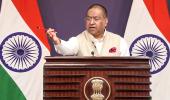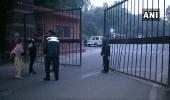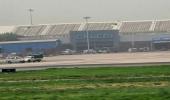India-Turkiye ties are strained over Ankara's Islamabad tilt, its arms links with Pakistan, and fallout from the Pahalgam terror attack.

India has officially taken note of Türkiye's diplomatic support and military assistance to Pakistan, both preceding and during Operation Sindoor, which followed the deadly terror attack in Pahalgam on April 22.
That Türkiye has been omitted from the 32-nation-plus-European Union itinerary of seven Indian delegations -- comprising parliamentarians, former Union ministers and ex-diplomats -- launching a global outreach campaign is, therefore, unsurprising.
Still, the absence is notable. In 2024 alone, 330,000 Indian tourists travelled to Türkiye -- a figure that reflects years of flourishing commercial and cultural ties.
That such relations have soured with striking suddenness has raised a few eyebrows, though foreign policy watchers caution that the trajectory has been trending downward for some time -- particularly since Recep Tayyip Erdoğan's rise to power, first as prime minister in 2003 and then as President from 2014.

In contrast to three visits to India -- in 2008, 2017, and most recently for the 2023 G20 Leaders' Summit -- Erdoğan has travelled to Pakistan no fewer than 10 times.
His overt affinity for Pakistan has never been discreet. Türkiye-Pakistan ties have deep roots, says Sanjay Bhattacharyya, India's former ambassador to Ankara (2018-2020), but Ankara has become "more vocal" in its support for Islamabad during Erdoğan's tenure.
What has sharpened this axis, Bhattacharyya argues, is Erdoğan's own political vision.
"There's an ambition -- to be both caliph and sultan -- that pushes him to build support among Muslims globally," he says.
"With limited acceptance among the Arab community, he's turned to regions like Central and South Asia, and Pakistan has been a very great ally in that pursuit."

At a press briefing on May 12, India's top military officials presented visual evidence of the wreckage of a Turkish-origin Baykar YIHA III kamikaze drone launched by Pakistan and neutralised by Indian forces.
Reports also surfaced of a Turkish warship and C-130 Hercules transport aircraft visiting Pakistan after the Pahalgam attack, potentially ferrying weapons.
According to the Stockholm International Peace Research Institute (Sipri), Türkiye's arms exports soared by 103 per cent between 2015 and 2019 and 2020 and 2024.
The London-based International Institute for Strategic Studies lists Türkiye as Pakistan's second-largest arms supplier, after China.
"The Turkish economy, in recent times, has been floundering, but its military industrial complex has actually done pretty well -- and for that Pakistan is a very good export market," Bhattacharyya says, adding that Türkiye has its own geopolitical play, with Pakistan as a willing "pawn".

Over the years, India's diplomatic overtures to Türkiye have been considerable.
From Jawaharlal Nehru and Rajiv Gandhi to Atal Bihari Vajpayee and Narendra Modi, Indian prime ministers have engaged with Ankara.
A distinguished line of ambassadors -- among them, later foreign secretaries C S Jha and Kanwal Sibal, and later President K R Narayanan -- have served in the Turkish capital.
The ministry of external affairs' own briefing note once highlighted the depth of shared history, citing exchanges between Ottoman Sultans and subcontinental rulers as early as 1481, and the cultural osmosis that left over 9,000 words in common between Turkish and Hindustani.

Asaduddin Owaisi, the Lok Sabha MP belonging to the All India Majlis-e-Ittehadul Muslimeen and member of one of the outreach delegations, has invoked this shared past in a bid to recalibrate Türkiye's present leanings.
"We must remind Türkiye that the early depositors in their national bank, Isbank, were people of India," he said, adding that Ankara must also be reminded that over 200 million Muslims live in India -- more than in Pakistan.
But New Delhi's patience appears to have been tested. Türkiye's own assertiveness in the Indian Ocean Region, from its base in Somalia to joint naval exercises with Pakistan since 2000 and recent drone sales to the Maldives, has not gone unnoticed.
Erdoğan's declaration in February of solidarity with 'Kashmiri brothers' drew sharp rebuke from India, which termed his comments 'unacceptable'. It also formally lodged its protest with the Turkish ambassador.
Türkiye has also helped Pakistan modernise its navy. India has, in turn, inched closer to Greece -- evident in the planned MP delegation to Athens -- and has thrown its weight behind the Republic of Cyprus.
The proposed India-Middle East-Europe Economic Corridor (IMEC), pointedly bypassing Türkiye, has also drawn Erdoğan's criticism.
By December 2024, there were, according to the external affairs ministry, approximately 3,000 Indian nationals in Türkiye -- 1,850 in Istanbul alone -- engaged in sectors ranging from banking to academia. Around 400 Indian students were also enrolled at Turkish universities.
But fraught relations on the ground take time to thaw, with calls to boycott Turkish imports (from marble to apples), advisories to Indian tourists and filmmakers, and security licence setbacks for Turkish companies like Çelebi Airport Services India.
Photographs curated by Manisha Kotian/Rediff
Feature Presentation: Rajesh Alva/Rediff











